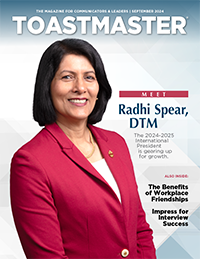 Illustration by Bart Browne
Illustration by Bart BrowneClick play to hear an exclusive podcast interview with Toastmaster Toolbox author Bill Brown, DTM, and the hosts of The Toastmasters Podcast.
One fear that many new Toastmasters have is giving their first speech. Another fear is receiving feedback. They dread the report from their evaluator. We tend to think of feedback as part of the process, something you have to put up with, but feedback is good. It is how we grow, and receiving feedback is actually a skill that we need to develop.
Like most skills, there are both basic and advanced skills. The Pathways Level 1 project “Evaluation and Feedback” (available in all paths) does an excellent job of describing the basics. Be sure to review the information.
As we develop in Toastmasters, we will ultimately move on to more advanced skills. Over the years, I’ve learned some specific tips to better receive and process feedback.
First, if you are reluctant to receive feedback, you are limiting your growth. Granted, you might be reluctant at first, and your evaluator should pick up on that and be sensitive in their remarks, but you should strive to move beyond that quickly.
There is a lot that goes into writing and delivering an effective speech. When we first start out, we normally don’t realize that. We think of it as writing and talking. The evaluation provides feedback, but it also makes us aware of the various aspects of speechwriting and delivery. It is, in part, a training tool.
The key is that you have to want the feedback. Get to the point that you crave the feedback, especially from those who are quite good at speaking. Decide that you will become an excellent speaker and work to achieve it—including obtaining feedback.
The second tip is to listen to and evaluate each piece of feedback you receive.
There are four types of feedback for speakers to assess. The first type is feedback that is relevant and important to you right now. Strategies for developing basic speechwriting and delivery skills are in this category, and that is why they are included in Level 1. Understand and apply these ideas right away.
If you are reluctant to receive feedback, you are limiting your growth.
The second type is feedback that is important, but not right away. For example, my primary area of expertise is vocal variety, but advanced vocal variety techniques are not necessary for the new speaker. That can wait for later, as you develop. If you determine that some feedback is in this category, keep the information for later. Put it in a folder where you can find it again, for it is valuable, but focus for now on where you need to grow.
The third category is feedback that is not necessarily valid. The feedback that you receive is someone else’s opinion. Their observations may reflect their preferences, which may not fit your style. If the feedback doesn’t make sense to you, feel free to reject it, but not before first considering it.
The fourth type of feedback is unexpected feedback. After you’ve given a number of speeches, you will probably notice there is a pattern in the feedback you receive in speech evaluations. The same topics will be discussed as you grow. But occasionally someone will tell you something that wasn’t even on your radar. Years ago, a new Toastmaster pointed out that I had a nervous habit of playing with the pocket flap on my sports jacket. That became something to work on. Had I not been listening for the unexpected, I probably would have missed it.
My final tip is to know where you need to grow. I have found that I am more effective in improving my speaking skills if I concentrate on a specific area or two and work to master them. Those areas may not be evident when you first start out, but they will after multiple evaluations.
Decide which topics are your priorities and dive in. Request that your evaluators pay particular attention to those areas. And if a member of your club is strong in one of those areas, ask them to give you pointers as you progress. In other words, recruit a mentor.
When you are confident in these areas, move on to others. Always be learning.
Bottom line: Look at receiving feedback as a skill that you need to develop. It isn’t just a quick response to an evaluation. It is one of the primary ways that you can become a truly effective speaker.
Now that you’ve read some tips on how to receive feedback, watch this video for some pointers on how to offer feedback.
Bill Brown, DTM is a speech delivery coach in Gillette, Wyoming. He is a member of Energy Capital Toastmasters in Gillette. Learn more at billbrownspeechcoach.com.
Related Articles

Evaluation
Making the Most of Evaluations

Evaluation
A Recipe for the Evaluation Sandwich

Personal Growth


